
So: why wouldn’t Canadian media publish Joe Vipond’s essay on climate distress?
Dr. Vipond questions whether avoidance of difficult emotions is really serving anyone
Hi there!
Welcome to Gen Dread, a newsletter about how the climate crisis is making us feel, why that’s happening, and what we can do about it. Subscribe now to find community, comfort, and practical coping and acting strategies from experts all around the world.
What if we walked toward our terror instead of running away from it?
Last week, we published Dr. Joe Vipond’s essay on climate distress, in part because it’s powerful, vulnerable, and real – and in part because nobody else in Canada would. This week, we bring you a conversation with Joe about the mainstream media’s discomfort with climate emotions and – as an ER doctor, masking advocate, and coal phase-out activist in Alberta – the profound parallels he’s observed between the climate crisis and the COVID-19 pandemic.
GD: Why do you think mainstream media wouldn't publish your climate essay?
JV: I think people are afraid of dealing with the emotions of climate change. There's an element of despair in the piece, but I also articulated about anger and my own personal hypocrisy and my sense of community and love. Like, when you're feeling that despair, it also hones the love you have for the wild spaces. I was out running in the woods yesterday doing a race. And I was like, I love the world. Maybe the element of despair was too much for our media. But I don't think there was anything in that piece that people shouldn't have heard.
GD: Why do you think people have this fear of difficult emotions?
JV: Well, emotions are hard, right? One of the reasons my piece wasn't picked up is because it's hard-hitting. I'm not pulling any punches. But maybe we need to embrace these emotions in order to get through this. The problem is that nothing we've tried so far has worked. Just talking about hope and a glorious transformation to a utopian future just doesn't seem to be working, and it also doesn't acknowledge the time element. There's that classic line “winning slowly is the same as losing”. Maybe we're winning slowly now, maybe not even, maybe we're still losing, but we're certainly not winning quickly. In order to win, we need to win quickly.
How climate activism prepared Joe to see COVID clearly
GD: As an ER doctor, do you see similarities between COVID and the climate crisis?
JV: I was one of the leading advocates for COVID mitigations. For years, I was the first person in Canada to ask for public masking advice. Way back when there was the request not to mask. “We shouldn't be masking because it was dangerous”. And that blew my mind. So I do think the parallels are very deep. If I hadn’t had my climate experience, I wouldn’t have been able to engage on COVID advocacy, partly because we have this heuristic. In life, one of the heuristics we use is that our leaders don't lie to us, and they have our best interests at heart. And I think a lot of people fall into that thinking and therefore can't recognize when it's not true. With the climate crisis, one of the huge elements is recognizing that our leaders have failed us and our systems are failing us. So it wasn't a huge leap for me to see that failure within our public health system when it came to COVID.
GD: We’ve seen the response from the media when you’ve tried to speak out on climate. Have you had a similar response speaking the truth about COVID?
JV: Well, if I can vent a bit: CBC [the Canadian Broadcasting Corporation] is our public radio. They're supposed to be objective. I was arguably the loudest person saying that there was airborne transmission. And then I heard through the CBC networks that I was no longer going to be invited to do interviews on CBC, because I was deemed “a radical” for saying COVID is airborne. I have not been invited to speak on anything for about two years. I had one national interview in November that went viral. 500,000 views. No interviews after that. And I struggle with that because it feels like voices are being suppressed. Now granted, people may say that I'm totally radical and my voice should never see the light of day, but I don't think I'm lying about anything, right? I'm not anti-science. I don't think speaking on airborne or asking for climate mitigations is equivalent to taking a hydroxychloroquine, Ivermectin, anti-vax position. It's fascinating to me that CBC and other spheres don't want to amplify voices that are asking for safety.
But there’s one interview question Joe finds frustrating
GD: It seems with both climate and COVID, there's a real failure to recognize that we’re part of a collective and we have a responsibility to each other. What do you think that resistance is about?
JV: Since the end of the Second World War, we’ve had this transition from feeling a part of a collective and working together towards shared goals and more towards individualism and libertarianism. And certainly neoliberalism – which is essentially putting markets and the economy above people. I don't know exactly who led the walk down this path away from collectivism but it's not just one country or one region. It seems to be global, especially in Western societies. And the problem is that the crises we face are, almost by definition, unsolvable by individual action. They demand systemic change.
Everyone's a libertarian until they get sick and have to go to the hospital, or until they have to drive their grain to the railway station on publicly created roads. But these existential crises have an immediacy that demands we work together now, and we're not capable of doing that. That's very frightening, because the solutions are possible. But they're only possible if we do them together…and we're not ready for that.
GD: In the face of this despair and anger you've been feeling, where do you get hope? Or do you?
JV: There’s no climate interview or event that doesn't have this question in it now. It's kind of frustrating, right? I'm not putting this on you, but I almost feel that most people are looking to whoever's presenting like, “throw me a bone! Throw me a reason why I shouldn't just go in the basement and watch Netflix and give up!” Here's where we're going to get the hope: if you start doing stuff instead of asking that question. We need people to be less, “oh my god, I hope somebody is going to do something to turn this around” and more “oh my god, I'd better go do something to turn this around.”
I do find it bizarre that the vast majority of the world is still going on like it's totally normal times. We do need to fill our buckets. We do need to have art and beauty and travel and nature to fill the bucket that allows us to do the hard stuff. But we also need to do the hard stuff. And I really think community-level collective action is the way out of this. We do need to build armies of people who care, who push those in power to make the right decisions.
Dr. Joe Vipond is an emergency doctor in Calgary, the past-President of the Canadian Association of Physicians for the Environment, and the co-founder of the Calgary Climate Hub.
If you liked reading this, feel free to click the ❤️ button on this post so more people can discover it on Substack 🙏🏼
Making Waves
We are learning just how much climate change impacts the physical and natural world around us—but how is it impacting our emotional well-being and mental health? How can we address the mounting mental health challenges that are speeding our way in a warming world? Our own Britt Wray will be sharing her knowledge and exploring these topics in a keynote session at #APA2023 on Friday, August 4, 1 - 1:50 PM ET.
The Loka Initiative is thrilled to announce the Resilience In The Anthropocene Online Summit from August 8-10, 2023. A 3-day FREE online gathering that brings together researchers, academics, experts from communities most impacted by environmental devastation and climate change, clinical and counseling psychology practitioners, and contemplative leaders to discuss eco-anxiety and climate distress within a framework of inner, community, and planetary resilience. Speakers include non-profit and community leaders, researchers and scientists from environmental, social, neuroscience and eco-psychology fields, contemplative practitioners and experts. Britt will be in dialogue with Professor Richard Davidson, Founder of the Center for Healthy Minds at the University of Wisconsin–Madison on Aug 8th at 9:15-10 AM CST. Please visit the link below for more detailed event information and register to join us!
As always, you can share your thoughts and reach the Gen Dread community by commenting on this article or replying to this email. You can also follow along on Twitter and Instagram.
‘Till next time!





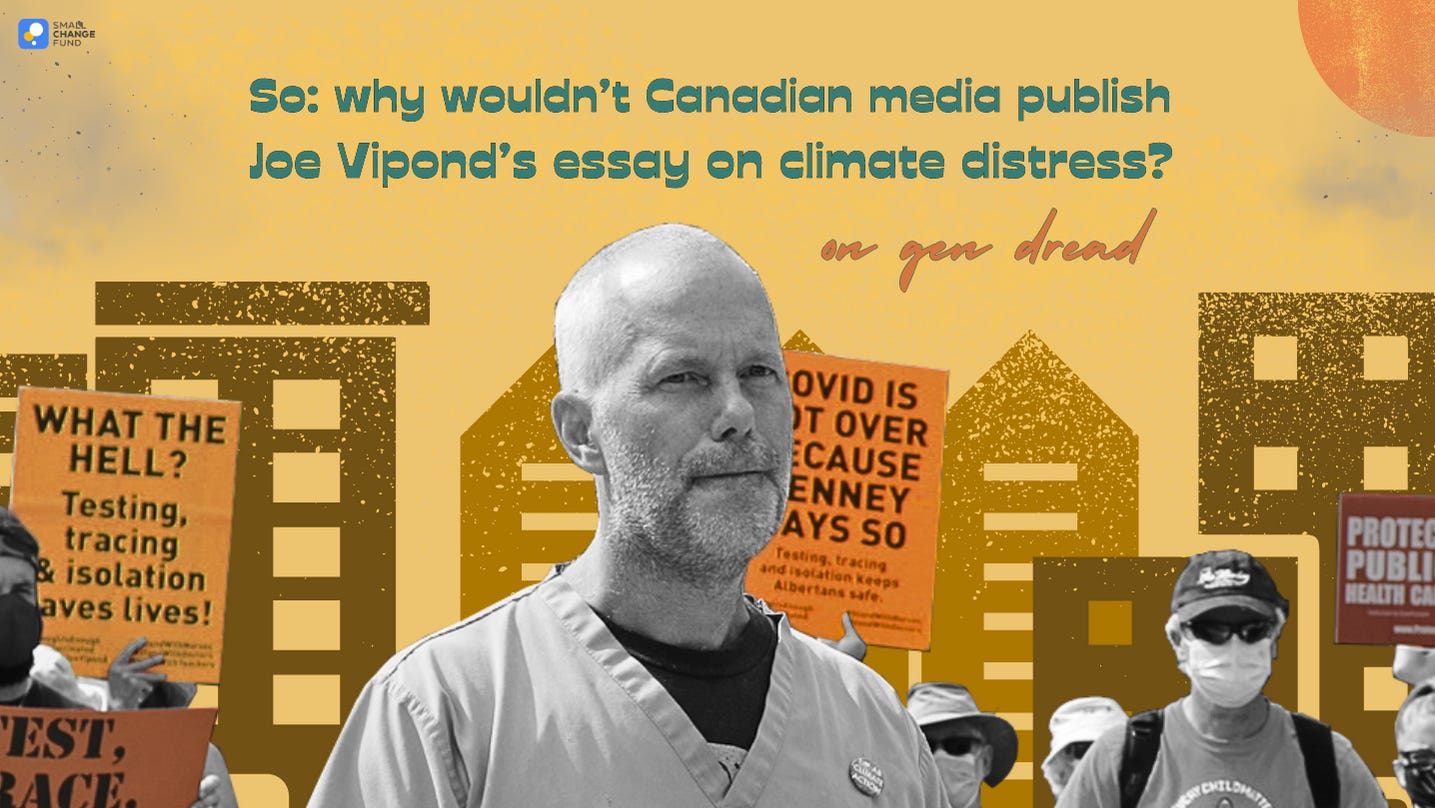
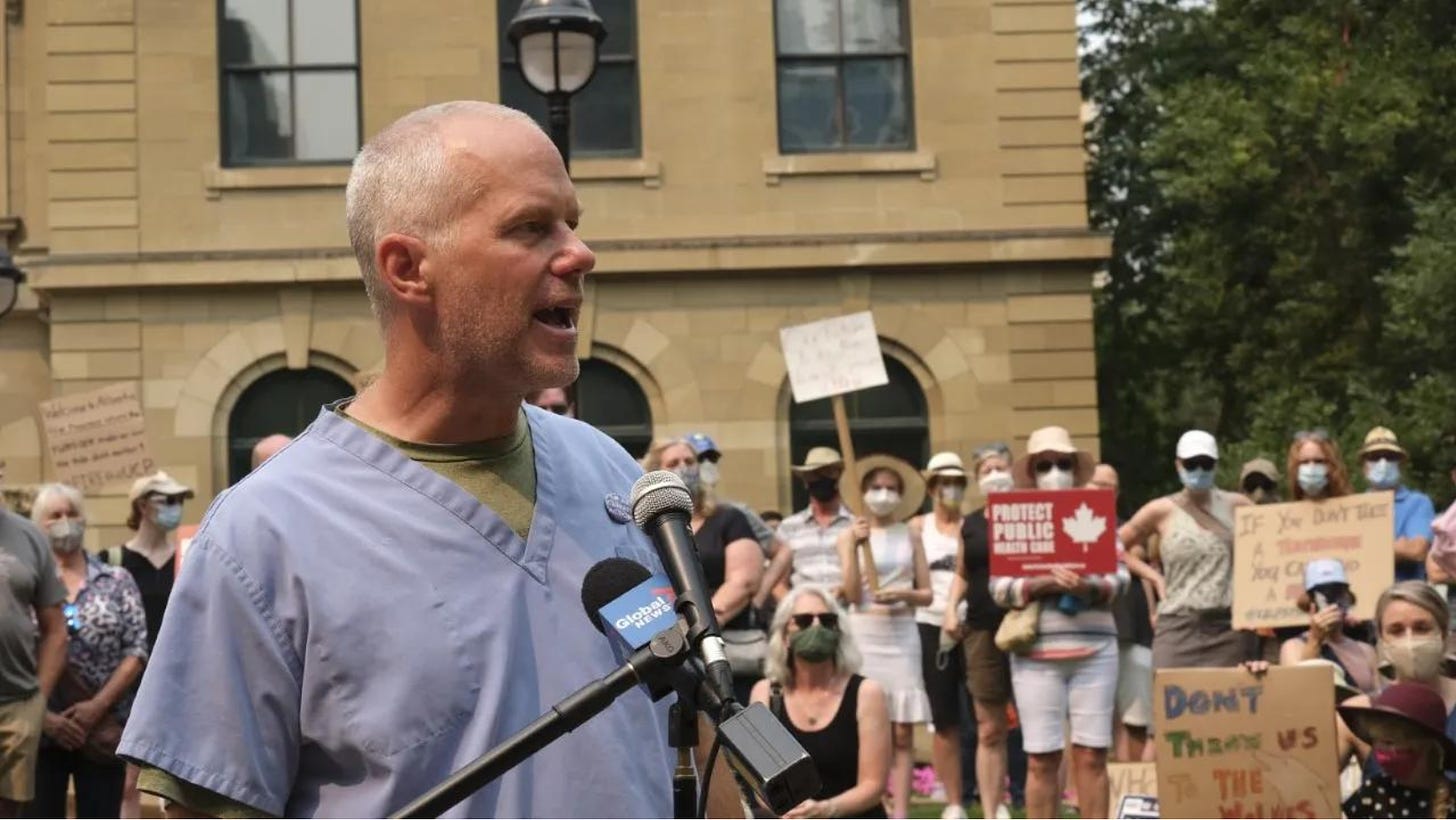
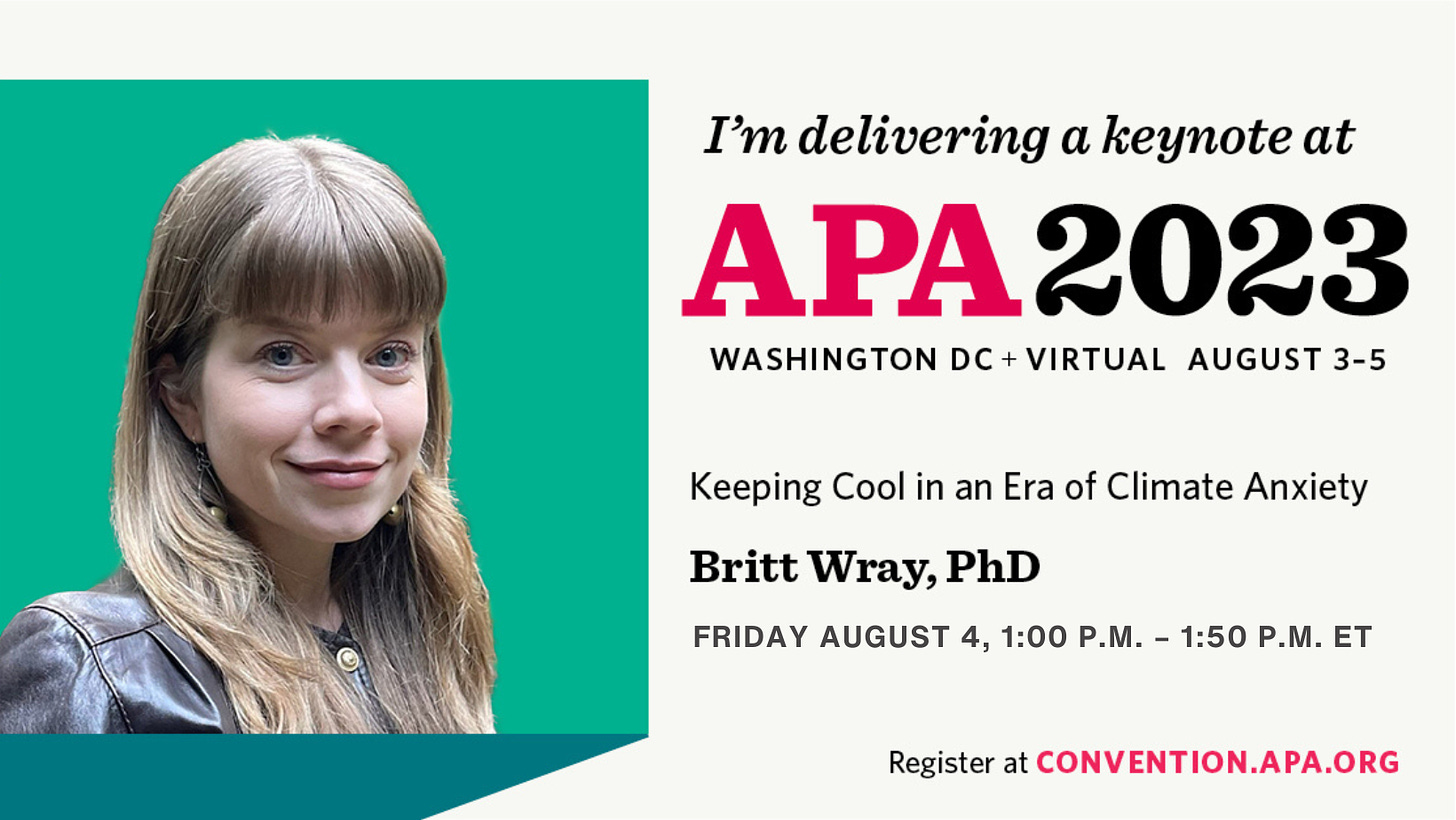
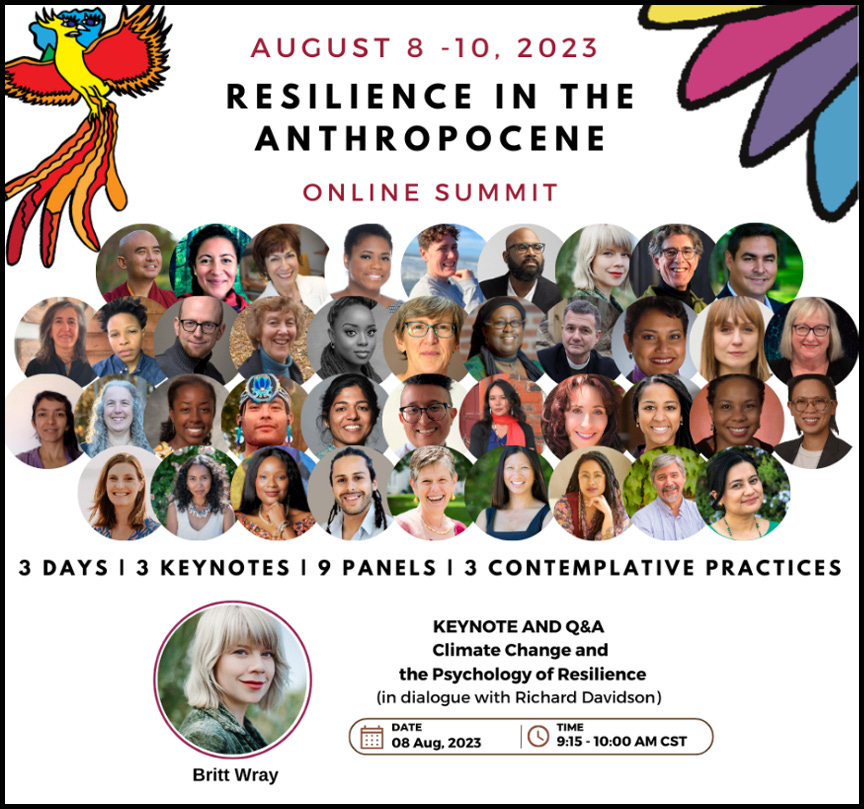





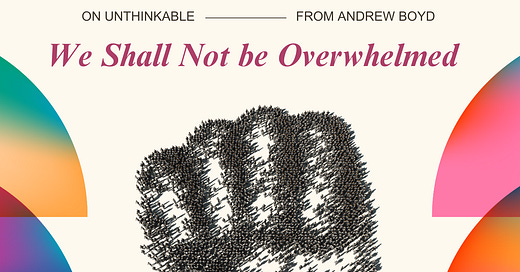

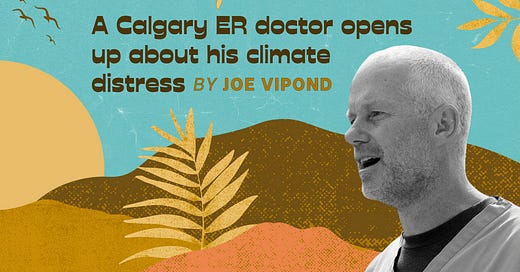

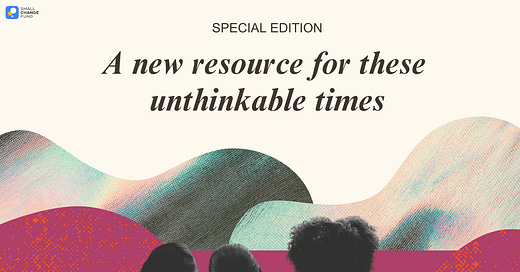

Excellent Article. He speaks the truth!
Editors and news producers make decisions every day about which articles, editorials, and essays to publish. Is it newsworthy? Is it interesting? Is the author credible? Is there an alternative piece that readers will find more engaging and truthful? The writer was able to get his essay placed - on someone else's substack blog. Isn't this validation enough of its worthiness?
If heat waves were as deadly as the media says they are, people could not have survived thousands of years without air conditioning. Homo sapiens are resilient. We adapt to changing conditions. In the past, heat waves were treated as a normal part of summer. Now we are barraged with heat warnings
and climate hypochondriacs who are telling the young people that they are doomed. Call it what you will - eco-anxiety, solastalgia, eco grief - if you are engaged in alarmism, you're probably just getting the young people to redirect their negative emotions toward something that can't really be accurately measured or changed - the changing climate. Climate has always been cyclical, and always will be.
Attributing every feeling of sadness or guilt to a so-called doomed climate or a doomed Earth makes people climate hypochondriacs - and they will only get worse with time - possibly resulting in mental
conditions worthy of the DSM-5.
Let's realize please that hot weather in summer is not aberrant, that it is normal to sometimes feel
sad, that a doctor can write a heartfelt, well-written essay expressing his true feelings and anxieties
and experience rejection of that essay, and that life goes on.
"... do not worry about tomorrow, for tomorrow will worry about its own things. Sufficient for the day is its own trouble." Matthew, last line of chapter 6.